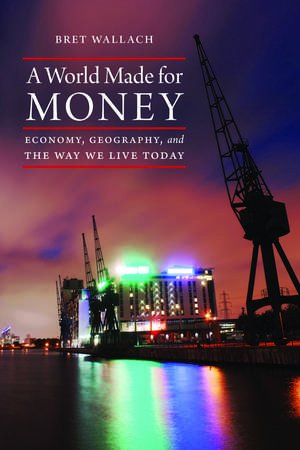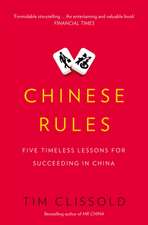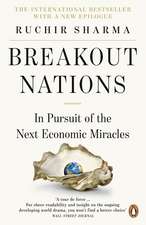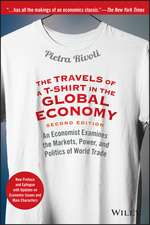A World Made for Money: Economy, Geography, and the Way We Live Today
Autor Bret Wallachen Limba Engleză Hardback – mai 2015
A spirited and incisive survey of economic geography, A World Made for Money begins with the author stopped at a red light in Norman, Oklahoma. Observing the landscape of drugstores and banks, and for that matter the stoplight and roads themselves, Bret Wallach observes, “Everything I see has been built to make money” or, at the very least, to facilitate making money. This, he argues, is a global phenomenon that nonetheless has occurred only within the past hundred years or so. Although guidebooks and culture brokers often disparage these landscapes of commerce, Wallach—recipient of a MacArthur “genius grant”—argues that we would do well to pay them close attention.
A World Made for Money provides a compelling, condensed tour of our world. From Silicon Valley to Sri Lanka, from post-Soviet Russia to post-apartheid South Africa, Wallach looks at how human beings are buying, manufacturing, working, growing and shipping food, and accessing the natural resources to fuel it all. These essential facets of daily life, propelled by the profit motive, represent a transnational force shaping our surroundings and environment in ways that may not always be beautiful (or even healthy) but that are fundamental to understanding how the world works in the twenty-first century. Wallach examines the relationship between acquisitiveness and landscape, reveals surprising contradictions and nuances, and provides fresh perspective on politically charged topics such as sprawl, deindustrialization, and agribusiness.
A World Made for Money provides a compelling, condensed tour of our world. From Silicon Valley to Sri Lanka, from post-Soviet Russia to post-apartheid South Africa, Wallach looks at how human beings are buying, manufacturing, working, growing and shipping food, and accessing the natural resources to fuel it all. These essential facets of daily life, propelled by the profit motive, represent a transnational force shaping our surroundings and environment in ways that may not always be beautiful (or even healthy) but that are fundamental to understanding how the world works in the twenty-first century. Wallach examines the relationship between acquisitiveness and landscape, reveals surprising contradictions and nuances, and provides fresh perspective on politically charged topics such as sprawl, deindustrialization, and agribusiness.
Preț: 307.45 lei
Nou
Puncte Express: 461
Preț estimativ în valută:
58.83€ • 61.58$ • 48.97£
58.83€ • 61.58$ • 48.97£
Carte disponibilă
Livrare economică 10-24 martie
Preluare comenzi: 021 569.72.76
Specificații
ISBN-13: 9780803298910
ISBN-10: 0803298919
Pagini: 488
Ilustrații: Index
Dimensiuni: 152 x 229 x 41 mm
Greutate: 0.86 kg
Editura: Nebraska
Colecția University of Nebraska Press
Locul publicării:United States
ISBN-10: 0803298919
Pagini: 488
Ilustrații: Index
Dimensiuni: 152 x 229 x 41 mm
Greutate: 0.86 kg
Editura: Nebraska
Colecția University of Nebraska Press
Locul publicării:United States
Notă biografică
Bret Wallach is a professor of geography at the University of Oklahoma. A MacArthur Fellow, he is the author of several books, including Understanding the Cultural Landscape; Losing Asia: Modernization and the Culture of Development; and At Odds with Progress: Americans and Conservation.
Cuprins
Introduction
1. Shopping
2. Making
3. Moving
4. Fueling
5. Mining
6. Farming
7. Developing
8. Building
9. Escaping
Postscript
Notes
Index
Recenzii
"Fascinating, memorable—a grand book."—E. J. Delaney, CHOICE
“A compelling book, written by one of geography’s most gifted writers.”—Kent Mathewson, professor of geography and anthropology at Louisiana State University and coeditor of Re-Reading Cultural Geography
“In this lively and energetic book Bret Wallach uncovers the forces that are changing the face of the earth—from Guangdong Province to Youngstown, Ohio—in their restless search for money.”—David Wishart, author of The Last Days of the Rainbelt








